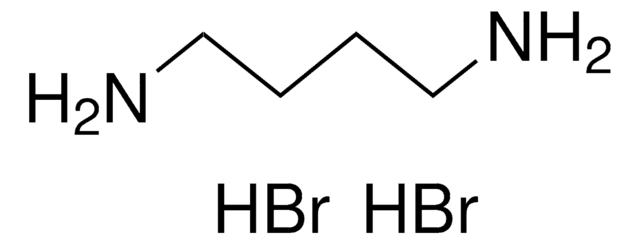921262
4arm-PEG2K-Acrylate
average Mn 2,000
Synonym(s):
4-ArmPEG-AC, 4arm-PEG-ACLT, 4arm-PEG-Acrylate
Sign Into View Organizational & Contract Pricing
All Photos(1)
About This Item
Linear Formula:
C(CH2O(CH2CH2O)nCH2CH2OOCCHCH2
UNSPSC Code:
12162002
NACRES:
NA.23
Recommended Products
Assay
95% (by HPLC)
Quality Level
form
semisolid
mol wt
average Mn 2,000 (by NMR)
average Mn 2,000
reaction suitability
reaction type: Polymerization Reactions
color
colorless to orange
polymer architecture
shape: 4-arm
functionality: homofunctional
storage temp.
−20°C
Application
Polyethylene glycols (PEGs) are FDA approved hydrophilic polymers. They are non-toxic, non-immunogenic and non-antigenic, and are widely used in a variety of biomedical applications such as bioconjugation, drug delivery, surface functionalization, and tissue engineering. 4arm-PEG2K-Acrylate is a four-arm PEG with acrylate end functional groups on each arm. 4arm-PEG2K-Acrylate has applications in PEG hydrogels for drug delivery, 3D bioprinting and tissue engineering.
Storage Class Code
11 - Combustible Solids
WGK
WGK 3
Flash Point(F)
Not applicable
Flash Point(C)
Not applicable
Choose from one of the most recent versions:
Already Own This Product?
Find documentation for the products that you have recently purchased in the Document Library.
Sebastian Joas et al.
Gels (Basel, Switzerland), 4(3), 69-69 (2019-01-25)
Hydrogels are an interesting class of materials used in extrusion-based 3D printing, e.g., for drug delivery or tissue engineering. However, new hydrogel formulations for 3D printing as well as a detailed understanding of crucial formulation properties for 3D printing are
Recent Applications of Polyethylene Glycols (PEGs) and PEG Derivatives
Hutanu D, et al.
Modern Chemistry & Applications, 2:2-2:2 (2014)
Alex A Aimetti et al.
Biomaterials, 30(30), 6048-6054 (2009-08-14)
Degradable hydrogels have been extensively used in biomedical applications such as drug delivery, and recent interest has grown in hydrogels that degrade in recognition of a cellular response. This contribution describes a poly(ethylene glycol) (PEG) hydrogel platform with human neutrophil
Our team of scientists has experience in all areas of research including Life Science, Material Science, Chemical Synthesis, Chromatography, Analytical and many others.
Contact Technical Service








